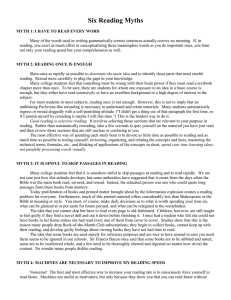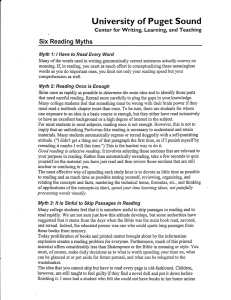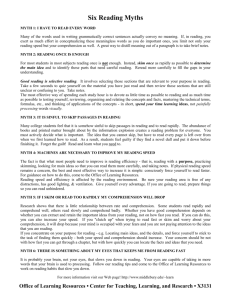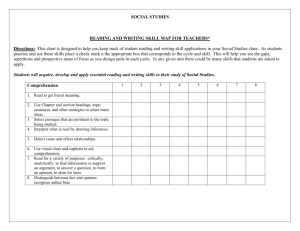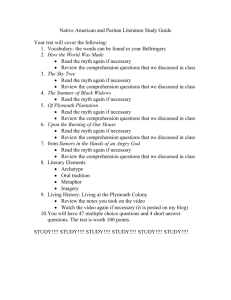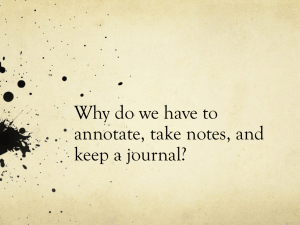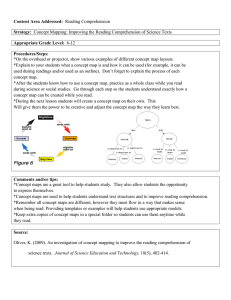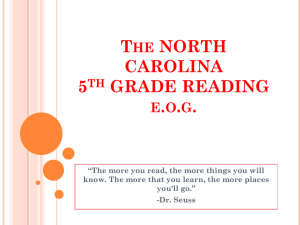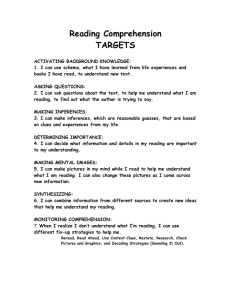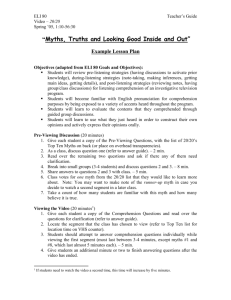Six Reading Myths
advertisement
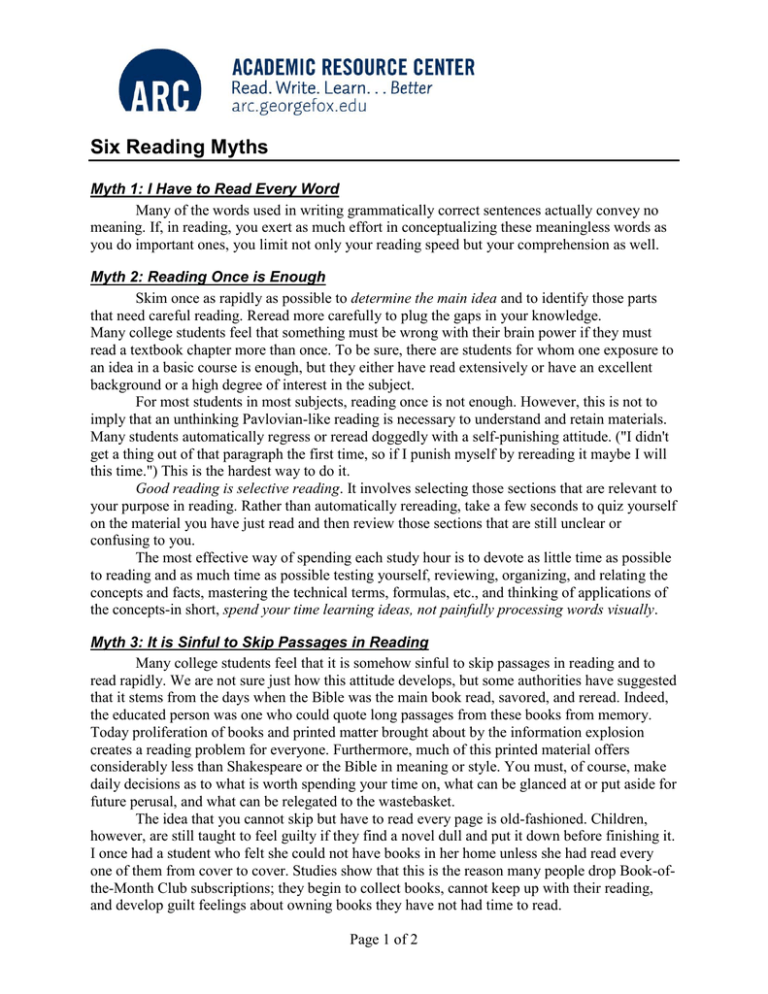
Six Reading Myths Myth 1: I Have to Read Every Word Many of the words used in writing grammatically correct sentences actually convey no meaning. If, in reading, you exert as much effort in conceptualizing these meaningless words as you do important ones, you limit not only your reading speed but your comprehension as well. Myth 2: Reading Once is Enough Skim once as rapidly as possible to determine the main idea and to identify those parts that need careful reading. Reread more carefully to plug the gaps in your knowledge. Many college students feel that something must be wrong with their brain power if they must read a textbook chapter more than once. To be sure, there are students for whom one exposure to an idea in a basic course is enough, but they either have read extensively or have an excellent background or a high degree of interest in the subject. For most students in most subjects, reading once is not enough. However, this is not to imply that an unthinking Pavlovian-like reading is necessary to understand and retain materials. Many students automatically regress or reread doggedly with a self-punishing attitude. ("I didn't get a thing out of that paragraph the first time, so if I punish myself by rereading it maybe I will this time.") This is the hardest way to do it. Good reading is selective reading. It involves selecting those sections that are relevant to your purpose in reading. Rather than automatically rereading, take a few seconds to quiz yourself on the material you have just read and then review those sections that are still unclear or confusing to you. The most effective way of spending each study hour is to devote as little time as possible to reading and as much time as possible testing yourself, reviewing, organizing, and relating the concepts and facts, mastering the technical terms, formulas, etc., and thinking of applications of the concepts-in short, spend your time learning ideas, not painfully processing words visually. Myth 3: It is Sinful to Skip Passages in Reading Many college students feel that it is somehow sinful to skip passages in reading and to read rapidly. We are not sure just how this attitude develops, but some authorities have suggested that it stems from the days when the Bible was the main book read, savored, and reread. Indeed, the educated person was one who could quote long passages from these books from memory. Today proliferation of books and printed matter brought about by the information explosion creates a reading problem for everyone. Furthermore, much of this printed material offers considerably less than Shakespeare or the Bible in meaning or style. You must, of course, make daily decisions as to what is worth spending your time on, what can be glanced at or put aside for future perusal, and what can be relegated to the wastebasket. The idea that you cannot skip but have to read every page is old-fashioned. Children, however, are still taught to feel guilty if they find a novel dull and put it down before finishing it. I once had a student who felt she could not have books in her home unless she had read every one of them from cover to cover. Studies show that this is the reason many people drop Book-ofthe-Month Club subscriptions; they begin to collect books, cannot keep up with their reading, and develop guilt feelings about owning books they have not had time to read. Page 1 of 2 The ideas that some books are used merely for reference purposes and are nice to have around in case you need them seems to be ignored in our schools. Sir Francis Bacon once said that some books are to be nibbled and tasted, some are to be swallowed whole, and a few need to be thoroughly chewed and digested. No wonder many people dislike reading. Myth 4: Machines are Necessary to Improve My Reading Speed Nonsense! The best and most effective way to increase your reading rate is to consciously force yourself to read faster. Machines are useful as motivators, but only because they show you that you can read faster without losing understanding. Remember that they are inflexible, unthinking devices that chum away at the same rate regardless of whether the sentence is trivial or vital, simple of difficult. They are limited too, for if you are practicing skimming, you are looking for main ideas so that you can read more carefully. Since these may not be located in a definite pattern (e.g., one per line) nor equally spaced so that the machine can conveniently time them, machines may actually slow you down and retard the speed with which you locate the ideas that you need for understanding. If you find yourself in need of a pusher, use a 3x5 card as a pacer, or use your hand, or your finger. However, there is one caution you should observe if you try this. Be sure that your hand or finger or card is used to push, not merely to follow your eyes. Myth 5: If I Skim or Read too Rapidly My Comprehension Will Drop Many people refuse to push themselves faster in reading for fear that they will lose comprehension. However, research shows that there is little relationship between rate and comprehension. Some students read rapidly and comprehend well, others read slowly and comprehend poorly. whether you have good comprehension depends on whether you can extract and retain the important ideas from your reading, not on how fast you read. If you can do this, you can also increase your speed. If you "clutch up" when trying to read fast or skim and worry about your comprehension, it will drop because your mind is occupied with your fears and you are not paying attention to the ideas that you are reading. If you concentrate on your purpose for reading-e.g. locating main ideas and details, and force yourself to stick to the task of finding them quickly-both your speed and comprehension could increase. Your concern should be not with how fast you can get through a chapter, but with how quickly you can locate the facts and ideas that you need. Myth 6: There is Something About My Eyes That Keeps Me From Reading Fast This belief is nonsense too, assuming that you have good vision or wear glasses that correct your eye problems. Of course, if you cannot focus your eyes at the reading distance, you will have trouble learning to skim and scan. Furthermore, if you have developed the habit of focusing your eyes too narrowly and looking at word parts, it will be harder for you to learn to sweep down a page of type rapidly. Usually it is your brain, not your eyes, that slows you down in reading. Your eyes are capable of taking in more words than your brain is used to processing. If you sound out words as you read, you will probably read very slowly and have difficulty in skimming and scanning until you break this habit. Adapted from University of Puget Sound Learning Center, used with permission
